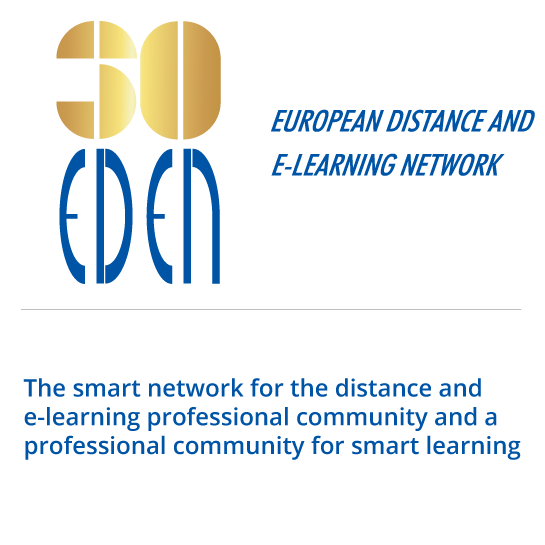Papers speed-dating session format
The speed dating session format was first introduced by EDEN at the 8th Research Workshop in Oxford and the experiment was a great success. The duration of these speed-dating paper sessions will be 90 minutes, containing 6-8 presentations. The concept is to trigger and enable feedback and enhance discussions about the papers in a lively, interactive environment.
Presenters, if they wish to use PowerPoint slides for their short (6 min.) presentation (max. 4 slides including title), are asked to submit them via the online presentation form by 1 June as latest in order to be uploaded to the computers in the rooms in advance. Authors may test the smooth running of their presentation during the break before the session.
Structure of the session
- The Session Chair introduces the speed dating concept and keeps the time of short presentations during the first block of the session.
- Presenters have 5-6 minutes to cover key concepts and ideas in their papers and pose questions for the following discussion.
- After the flash presentations the participants, including speakers and their audience, break into smaller thematic working groups where the paper presenters guide the discussions.
- The participants convene for a 10 minutes rapporting block before the closing of the session.
- The paper presenters report back to the whole group about the key messages coming from their group for 1-2 minutes per group.
All conference delegates will be given access to the electronic publication of the accepted papers before the event and will be enclouraged to familiarise themselves with the content of the speed dating sessions they will attend. This will allow the presenters to concentrate on highlighting the key points of their contribution instead of giving a thorough overview.
The technical equipment available in all the sessions rooms include laptop (MS Office, Power Point), beamer and WiFi. There will be technical assistants around to provide support if needed.
Poster sessions
One session will normally accommodate 8-9 posters. The sessions will be implemented as follows:
- Overall session introduction from the Moderator (2-3 minutes);
- Visiting the posters one by one as scheduled for the given session, presenting the individual posters beginning with brief comments from the moderator and a 2-3 minute more detailed introduction from the presenter, followed by questions and answers with the audience (2-3 minutes);
- Concluding notes from the Moderator.
Poster stands will be available in the poster display area, in sufficient number to accommodate all posters to be presented until the end of the conference. The recommended maximum size of the poster is ISO A0 (1189mm*841mm, vertical format). Please bring your own stationary tools (double-sticky tape, blue or white tack) to mount your poster on the stand.
Poster presenters are invited to fix their posters at 08.30 in the morning. Technical help will be available for those who may need assistance (but fixing all the posters can not be taken care of).
Moderators may contact their sessions poster presenters before the conference.
Poster Prize voting procedure
Delegates can vote for their favourite posters during the conference by sticking a gold star on the posters. All delegates will receive three stickers at the registration desk upon arrival.
The Poster Prize will be presented at the Closing Plenary Session.
Demonstration session arrangements
Demonstration sessions will be organised using the show and tell approach. There will be tables where the presenters can set up their demonstration. Authors are supposed to bring their own laptop with the demonstrated application / case / tool installed. No projector will be provided in these session rooms, but electrical power outlets will be available for all presenters. Although WiFi will be available, it is safer and recommended to run the demonstration from your computer.
At the beginning of the session, there will be a short (2-3 minute) introduction of each demonstration. Delegates attending the session can move around the tables to find out more about the showcases and discuss with the presenters one-on-one basis. Tabled information materials are welcome in order to present data/facts about the contributing organisation and the demonstrations offered.
Synergy sessions
These sessions will resemble the speed dating structure, beginning with flash presentations of basic information, key facts, achievements and aspirations the showcased projects and initiatives wish to share with the audience. The presentations will be followed by lively discussions organised in thematic working groups. All together 7 Synergy sessions will be held between Wednesday and Friday 6-7 initiatives in each one with the aim to discover basic points of synergies among the presented projects and practices. The expected outcomes are the foundations, or even roughly elaborate roadmaps, of mutually beneficial collaboration schemes.
Each participant is free to join any of the initially suggested 3-4 thematical working groups of the session, but the presenters could also decide to have more, less or different discussion groups as the group dynamics dictate. Every working group will have a facilitator to support meaningful and productive discussions.
Presenters, if they wish to use PowerPoint slides for their short (6 min.) presentation (max. 4 slides including title), are asked to submit them via the online presentation form by 1 June as latest in order to be uploaded to the computers in the rooms in advance. Authors may test the smooth running of their presentation during the break before the session.
WiFi availability on the site
At the conference venue WiFi (25/25) access will be available.

